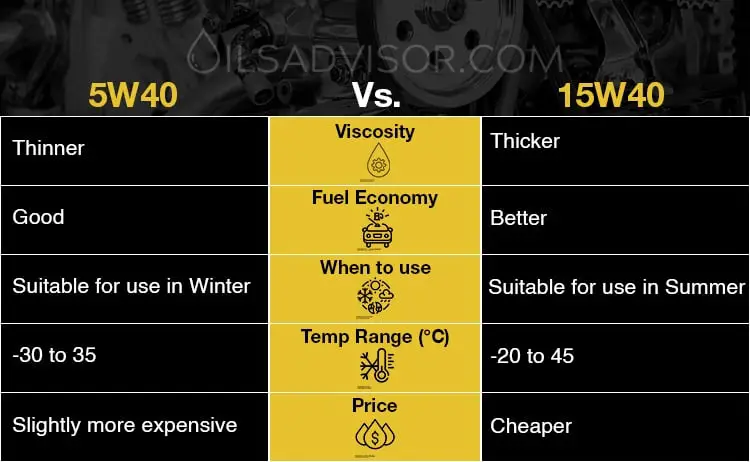Are you looking for the right motor oil for your engine? If yes, you likely know the role of good oil in your car engine’s performance.
However, to some car manufacturers, sometimes you need to use different oil grades in disparate conditions. For instance, if you are driving a vehicle with a 6.7 Cummins engine, it requires 5W-40 or 15W-40 oil. So, what are the differences between them?
This article provides a detailed comparison between 5W-40 vs. 15W-40 in terms of viscosity grade, performance, fuel economy, and applications. I’m sure by then you can know when to use them correctly.
Let’s get started!
Oil Numbers Meaning
If you take a look at the label on most motor oil on the market, you will see a bunch of numbers (5w-40, 15w-40, and 5w-30) on them. Understanding what these numbers mean will go a long way in helping you select the right one for your engine. Below is an overview of these figures.
The number before the W refers to the viscosity of the oil at low temperatures. If this number is high the oil will be thick at low temperatures. On the other hand, if it is low, the oil will be thin at low temperatures. Experts usually recommend thin oil during the cold season, as they can work through the motor engine quickly.
The W that is between the numbers stands for winter.
The number after the W represents the viscosity of the motor oil at high temperatures. The higher the number, the thicker the oil will be.
5w-40 Vs 15w-40: Key Things In Common
Multigrade oil
The 5w-40 and 15w-40 are both multigrade oil. This means that they can work perfectly well in a wide range of temperatures. So you can use them in the winter and the summer. Multigrade oil is better than monograde oil because its film doesn’t break, even at high temperatures.
“W40” Grade
Another thing the 5w-40 and 15w-40 have in common is the W40 rating. The 40 represents the viscosity of the motor oil at high temperatures. Since both oils have the same hot-viscosity grade, they also have the same level of thickness at high temperatures. What’s more, they will work in a similar way when the engine is running at 195 to 220℉.
5w-40 Vs 15w-40: Head-To-Head Comparison

5W-40 Oil

15W-40 Oil
To determine if the 5w-40 or the 15w-40 will be good for your engine, you need to have an overview of some key things about them. Below is a head-to-head comparison of the 5w-40 and 15w-40.

Viscosity
The 5w-40 and 15w-40 have the same viscosity in hot temperatures. But their low-temperature viscosity is different. The 5w-40 is thinner than the 15w-40. This means that 5w-40 will flow easier in cold weather than 15w-40. Besides, it also provides a better cold-start than 15w-40 in winter. On the other hand, the 15w-40 is thicker and is best used during hot seasons.
Main Features and Benefits
Below are some of the stand-out features of the 5w-40 and 15w-40.
5w-40
- High viscosity index
- Prevent wear caused by cold start
- High detergency and dispersancy level.
- Resistant against corrosion, foaming, and wear.
- Impressive oxidation and thermal stability.
15w-40
- Remarkable soot dispersancy
- Has anti-oxidation properties
- Remains stable at high temperatures
- Offers protection against corrosion and wear
- Perfect for vehicles with worn-out engines
Fuel Economy
The 5w-40 and 15w-40 can both help improve the performance of your engine and save fuel. But if you compare them side by side, the 5w-40 will come out on top. This is because the lower viscosity oil can provide better fuel economy than the higher one by decreasing engine friction.
Price
The 15w-40 is way cheaper than the 5w-40. Since it is affordable a lot of vehicle owners usually opt for it.
FAQs
1/ Why does Cummins want you to run 5w-40 vs 15w-40 synthetic?
Cummins wants vehicle owners to run the 5w-40 or 15w-40 because both engine oils are great. Even more, they can address the needs of an engine in various seasons. The 5w-40 is perfect for the cold season, while the 15w-40 is great for the hot season.
2/ Can you mix 5w-40 and 15w-40?
No, you should not mix the 5w-40 and 15w-40. Mixing both oils can void your vehicle’s warranty and affect its performance.
3/ Can I use 5W-40 instead of 15W-40?
The 15W-40 is an excellent alternative to the 5W-40, especially during the winter months. Since the 5w-40 is more viscous, it will be able to increase the performance of your engine, lower wear and tear during the cold season.
Conclusion
The 5w-40 and 15w-40 are high-performance synthetic motor engine oils that offer a lot of perks to engines. Before choosing between them, you should consider the weather condition in your region and the performance of your engine.
As mentioned above, 5w-40 is best used in cold regions or during the winter months. The 15w-40 engine oil is cheap and is an excellent option for old engines. Also, if you drive in hot regions, this oil type is a perfect choice. Regardless of the one you pick, you can be confident of getting amazing results.
Share with us which oil grade are you using now?
Related Reads
- 5w-30 Vs 10w-30: Detailed Comparison Understand the viscosity differences between 5W-30 and 10W-30 and see how these comparisons apply to 5W-40 and 15W-40 oils – Learn more.
- Liqui Moly vs. Mobil 1 – Which is the Better Option? Compare how Liqui Moly and Mobil 1 oils perform in 5W-40 and 15W-40 grades for various engines – Read more.
- Valvoline vs. Pennzoil Face-off: Narrowing Down the Best Engine Oil Discover which brand offers better options in 5W-40 and 15W-40 viscosities for your vehicle’s needs – Find out more.
- Kirkland Synthetic Oil vs. Mobil 1: Determining the Best Performance See how Kirkland Synthetic Oil and Mobil 1 compare in the 5W-40 and 15W-40 categories – Explore here.
- Understanding ILSAC GF-6: The Best Engine Oils for Modern Vehicles Learn about ILSAC GF-6 standards and how 5W-40 and 15W-40 oils meet these requirements for modern engines – Discover now.



Pingback: 0w20 Vs 5w20: Detailed Comparison - Oils Advisor